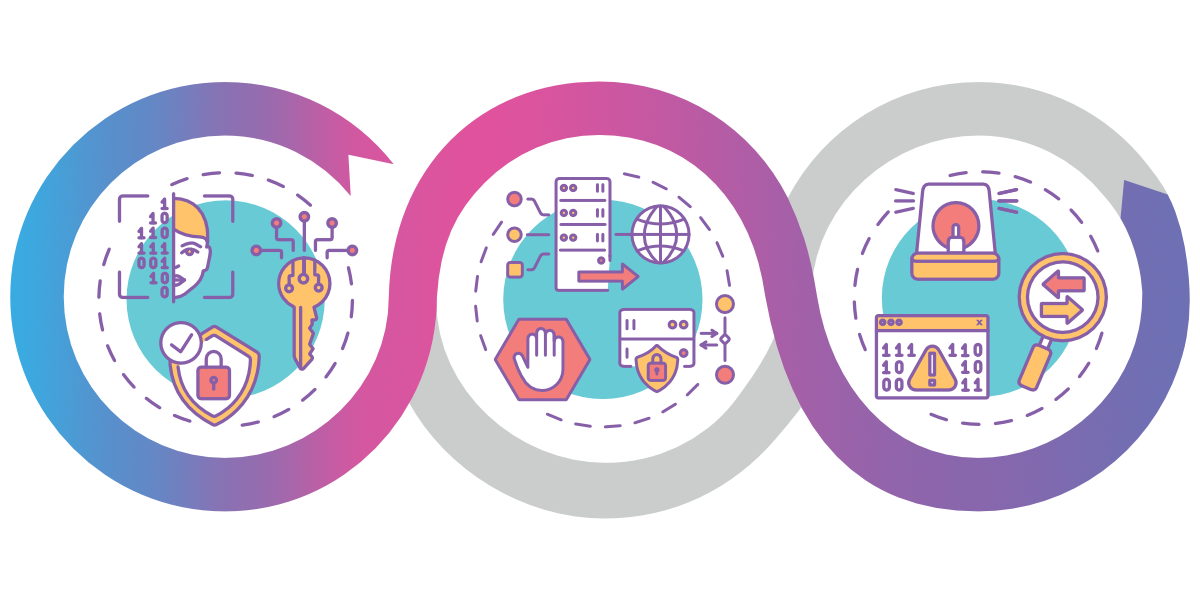Network Security Best Practices for Small Businesses
Last Updated on May 1, 2023
Table of Contents
Protecting Your Business: Essential Security Components
As a business owner or manager, you understand the importance of protecting your company's sensitive information and data. But unfortunately, one of the most significant threats to businesses today is the potential for cyber attacks.
This article will explore some of the most effective network security tools and practices that can help small and medium businesses keep their data safe.
Network Security Tools
Firewalls, antivirus software, and intrusion detection systems are the most common tools to protect computer networks from cyber threats.
Firewalls
A firewall is a network security device or software that monitors and controls the incoming and outgoing network traffic based on predetermined security rules.
A firewall is a barrier between your company's internal network and the internet. It prevents unauthorized access, blocks malicious traffic, and enforces network policies.
Benefits of firewalls include:
- Protecting against unauthorized access
- Blocking malicious traffic
- Enforcing network policies
Challenges of firewalls include:
- Configuration can be complex
- Performance impact
- False positives or negatives
Some top products for firewalls for small and medium businesses are:
- Fortinet
- pfSense
- Cisco Meraki
- Synology
- UniFi

Antivirus Software
Antivirus software is a program that scans files for malicious code and removes or quarantines them if detected. It helps prevent infection by viruses, worms, trojans, ransomware, and other types of malware.
Benefits of antivirus software include:
- Protecting data integrity
- Reducing downtime
- Enhancing user confidence
Challenges of antivirus software include:
- Consuming system resources
- Interfering with other applications
- Missing new or unknown threats
Some top products for antivirus software for small and medium businesses are:
- Malwarebytes
- BitDefender
- Windows Security
- ESET
Intrusion Detection Systems (IDS)
An intrusion detection system (IDS) is a network security device or software that monitors network traffic for signs of unauthorized access or attack. IDS can detect anomalies, provide visibility into network traffic patterns, and support forensic analysis.
Benefits of IDS include:
- Detecting anomalies
- Providing visibility into network traffic patterns
- Supporting forensic analysis
Challenges of IDS include:
- Being prone to false alarms
- Requiring constant updates
- Depending on skilled analysts
Some top products for IDS for small and medium businesses are:
- Carbon Black
- Synology
- UniFi Dream Router PRO
Network Monitoring
Network monitoring is the process of tracking and analyzing network traffic to identify security threats and performance issues. Network monitoring can help detect and prevent intrusions, identify abnormal traffic patterns, and optimize network performance. It also helps businesses maintain compliance with security regulations, provides insight into user behavior and enables proactive troubleshooting.
Benefits of network monitoring include:
- Detecting and preventing network intrusions
- Identifying abnormal traffic patterns
- Optimizing network performance
Challenges of network monitoring include:
- Being resource-intensive
- Generating large amounts of data
- Requiring skilled personnel to interpret the results
Some top products for network monitoring for small and medium businesses are:
- SolarWinds Network Performance Monitor
- ManageEngine OpManager
- PRTG Network Monitor
- Fing

Best Practices
In addition to using network security tools, businesses should train their employees on the best network security approaches. Here are some best practices that companies can follow:
Employee Training
Train employees on password management, email security, and safe browsing practices. Establish security policies that prohibit the use of personal devices on the company network and require the use of strong passwords and multifactor authentication.
Software Updates
Keeping software and firmware up-to-date is another critical aspect of network security. Many security breaches occur due to outdated software with known vulnerabilities. Therefore, businesses should keep all software, including operating systems, applications, and network devices, up-to-date with the latest security patches.
Benefits of software updates include:
- Patching known vulnerabilities
- Improving system performance
- Enabling new features and functionality
Challenges of software updates include:
- Disruption of business operations during updates
- Compatibility issues with legacy systems
- The potential for new bugs or compatibility issues
Data Backups
Regular data backups are also a critical aspect of network security. Backups allow businesses to restore their data in case of a breach or disaster. However, backups must be stored securely, and the backup process should be tested regularly to ensure that data can be restored in an emergency.
Benefits of data backups include:
- Protecting against data loss due to cyber attacks or disasters
- Restoring data quickly after a breach or disaster
- Enabling business continuity
Challenges of data backups include:
- The cost of backup storage and equipment
- Ensuring that backups are stored securely
- Testing the backup process regularly to ensure that data can be restored in an emergency

Managed IT Services
Finally, businesses can consider hiring a managed IT services provider to assist with network security. Managed IT providers can offer 24/7 network monitoring, regular security assessments, and customized security solutions to fit your business's needs.
Benefits of managed IT services include:
- Access to specialized expertise
- 24/7 network monitoring
- Customized security solutions
Challenges of managed IT services include:
- The cost of hiring a provider
- The potential for miscommunication between the provider and the business
- The need to find a provider with a track record of success
Conclusion
Protecting your business from cyber threats is a top priority. By using network security tools such as firewalls, antivirus software, intrusion detection systems, network monitoring, and following best practices, small and medium businesses can maintain it compliance and the integrity of their networks and protect their business from potential cyber threats.
At iFeeltech, we understand the importance of network security and the potential consequences of a data breach. That's why we offer a free network assessment service to help you understand your network's security and identify any potential vulnerabilities. Then, our team of experienced IT professionals will work with you to create a customized security plan that fits your business's needs.
Don't wait until it's too late. Instead, contact us today to schedule your free network assessment and take the first step in protecting your business from cyber threats.



Leave a Reply
Want to join the discussion?Feel free to contribute!